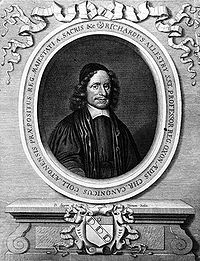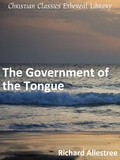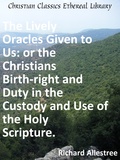Richard Allestree
Anglican divine
Biography
Richard, the son of Robert Allestree, was born at Uppington in Shropshire. He was educated at Coventry and later at Christ Church College, Oxford, under Richard Busby. He entered as a commoner in 1636, was made a student shortly afterwards, and took the degree of B.A. in 1640 and of M.A. in 1643. In 1642 he joined the king's army, under Sir John Biron. When the parliamentary forces arrived in Oxford, he hid the Christ Church valuables, and the soldiers found nothing in the treasury "except a single groat and a halter at the bottom of a large iron chest." Allestree escaped severe punishment only because the army hastily retreated from the town. He was present at the Battle of Edgehill in October 1642, after which, while hurrying to Oxford to prepare for the king's visit to Christ Church, he was captured by a troop of Lord Say's soldiers from Broughton House, and soon afterwards set free on the surrender of the place to the king's forces. In 1643 he was again on military service, performing "all duties of a common soldier" and "frequently holding his musket in one hand and his book in the other."
At the close of the English Civil War, he returned to his studies, took holy orders, was made censor and became a "noted tutor." He remained an ardent royalist. He voted for the university decree against the Covenant, and, refusing submission to the parliamentary visitors in 1648, he was expelled. He found a retreat as chaplain in the house of Francis Newport, later Viscount Newport, in whose service he traveled to France. On his return he joined two of his friends, Dolben and Fell, afterwards respectively Archbishop of York and Bishop of Oxford, and later joined the household of Sir Antony Cope of Hanwell, near Banbury. He was now frequently employed in carrying dispatches between the future Charles II of England and royalist sympathizers. In May 1659 he brought a command from Charles in Brussels, directing the Bishop of Salisbury to summon all bishops to consecrate clergymen to various sees "to secure a continuation of the order in the Church of England," then in danger of becoming extinct.
While returning from one of these missions, in the winter before the Restoration, he was arrested at Dover and committed a prisoner at Lambeth Palace, then used as a jail for royalists, but was freed after a few weeks at the instance, among others, of Lord Shaftesbury. At the Restoration he became canon of Christ Church, D.D. and city lecturer at Oxford. In 1663 he was made chaplain to the king and Regius Professor of Divinity. In 1665 he was appointed provost of Eton College, and proved himself a capable administrator. He introduced order into the disorganized finances of the college and procured the confirmation of William Laud's decree which reserved five of the Eton fellowships for members of King's College. His additions to the college buildings were less successful; for the "Upper School," constructed by him at his own expense, was falling into ruin almost in his lietime, and was replaced by the present structure in 1689. Allestree was buried in the chapel at Eton College, where there is a Latin inscription to his memory.


